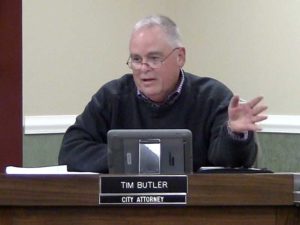Council, council-elect express dismay, disappointment over mayor’s ‘gag order’
By JIM BROOKS
Nelson County Gazette / WBRT Radio
Thursday, Dec. 8, 2016 — Mayor John Royalty’s directive prohibiting the city council from talking directly to city workers in the wake of its decision to investigate the the administration drew a chorus of critical comments from both the sitting council and council-elect at Tuesday night’s working session.
The day after the council voted to move forward with the investigation, Royalty sent a memo to city department heads advising them to tell employees they are not to answer questions from members of the council or investigators who may be part of any investigation. Questions to city staff from the council must be submitted in writing to the mayor, and the mayor will forward the request to the appropriate channels.

Councilman-elect John Kelley poses questions about the mayor’s directive prohibiting city employees from answer questions posed by the city council in the wake of the council’s vote to investigate the administration.
The mayor’s memo refers to a portion of state law — KRS 83A.130(13) — that speaks to a council’s investigation of the activities of city government. Royalty said he took the action in an effort to protect city employees, though the council and council-elect were not convinced.
“Do you mean I can’t call [Tracey Hudson, chief financial officer] and she can’t talk to me? That’s going to make it impossible for us to do our job,” Hagan said. “If I have to send a request to you to give to her, I may not get the answer back before the next meeting. What does me asking Tracey a question on the budget have to do with the investigation?”
“My duty is to the citizens of Bardstown and the city employees, and when they come to me worried about being investigated …. I’m just looking out for the employees,” Royalty said.
City personnel director Larry Green defended the mayor’s actions.
“To put something in writing is an inconvenience, but it preserves the integrity of the investigation and the administration not wondering if opportunities to to talk with employees are going to harm the administration or ultimately the city taxpayers as the investigation moves forward,” Green told the council.

City attorney Tim Butler answers a question about the mayor’s right to direct city employees to do their jobs.
“It would be wonderful if we could all say ‘we’re all reasonable here, any any reasonable question that doesn’t have to do with the investigation would be ok,’ but we’re in an adversarial situation here,” he said.
Hagan pointed out that the investigation would be based on sworn testimony and not conversations council members have with city hall staff, and asked how a conversation with the chief financial officer would wind up impacting any investigation.
“It’s not sworn testimony; we’re not going to run and tell the investigator,” he said “It’s going to unduly hamper the effectiveness of the city council to do its business.”
Hagan said the mayor’s directive was an attempt to try to “stop something that has no possibility of affecting the outcome of the investigation.”
Three of the four councilmen-elect at the meeting also spoke critically of Royalty’s decision.
Dick Heaton called the mayor’s edict a “gag order” that would restrict the council’s effectiveness. John Kelley challenged the mayor’s use of the state statute to restrict the council from talking with city employees about normal city business, stating that the use of the statute was “way out.”
“I don’t know how a council person can be expected to do their business if everything has to be filtered through the mayor’s office,” Kelley said.
Heaton and Kelley’s line of questioning revealed the irony of the situation — under the mayor’s directive, the council cannot ask employees questions directly, however the council-elect have complete freedom to talk to and ask questions of city employees and department heads.
Councilwoman Kecia Copeland was critical of the mayor’s directive, stating it showed the mayor lacked faith in his department heads.
“It makes it look like we’re targeting employees and we’re not,” she said.
She asked Royalty what sort of response time the council members can expect since their communications must be routed through the mayor.
Royalty said he only checks his email in the evenings, and would not offer a specific response time.
“I don’t sit at the computer all day long, I have other things I have to do,” he said.
When Copeland pressed him, he finally said he would act on their requests within 72 hours.
When asked for his opinion on the mayor’s directive, City Attorney Tim Butler said the mayor has the right to direct employees how to do their job, but given the fact an investigator hasn’t been located and there is no investigation yet, he said he thought the mayor’s actions “were a little broad and a little premature.”
Councilman Bill Buckman defended the mayor’s actions, saying that city employees are worried they are being investigated individually since the council refused to say who they are investigating.
“So be it,” he told the rest of the council of the mayor’s decision. “You made your bed, lie in it. The mayor has the right to protect employees.”
-30-






